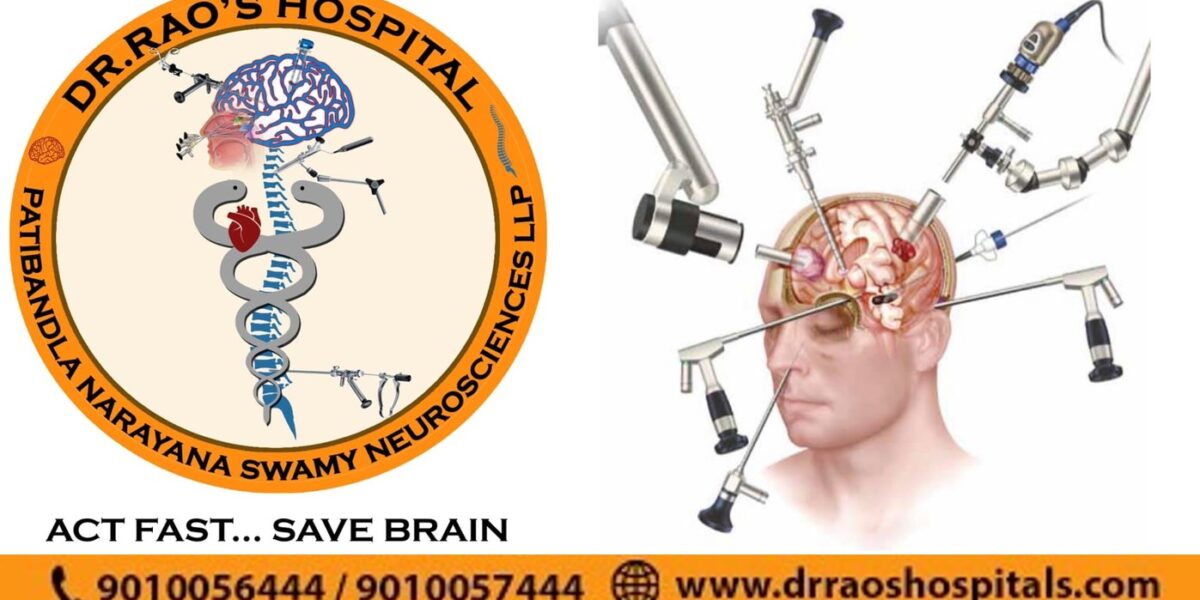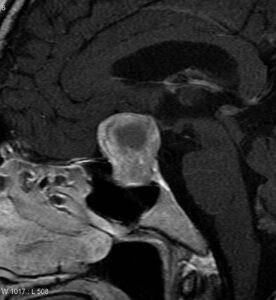Acromegaly: A Functional Pituitary adenoma – Growth hormone excess


Acromegaly is the result of a pituitary adenoma that produces growth hormone (GH). Elevated GH causes excessive bone and soft tissue growth. It can lead to gigantism in children and adolescents. After puberty, bones lose their ability to grow and therefore, adults don’t grow tall when they develop acromegaly.
The average age at diagnosis is 40-45 years, but acromegaly can develop at any age. Because sympto
Pituitary adenoma produces growth hormone (GH); in acromegaly, the hormone production increases, which leads to a disease called acromegaly. It causes the excessive bone and soft tissue growth. Bones stop growing after puberty; therefore, adults don’t grow tall when they develop acromegaly. In children, it is called gigantism, which can lead to tall stature with coarse features.
Acromegaly has many complications and may cause early death secondary to hypertensive heart failure. Diagnosis will be delayed for a prolonged time as the early features are not diagnostic. Patient age at diagnosis will generally be 40-45 years, but it appears at any age. Looking for the best acromegaly care in Guntur, look no further; Dr. Rao’s hospital is the best micro neurosurgery and stereotactic radiosurgery hospital in Guntur and India; call us at @9010056444.
Symptoms
Symptoms include:
- Abnormally large growth and deformity of the:
- Face (protrusion of brow and lower jaw)
- Hands
- Feet
- Lips
- Tongue (causing snoring and obstructive sleep apnea)
- Jaw (overbite)
- Vocal cords, soft tissues of the throat larynx, sinuses (deep sonorous voice)
- Carpal tunnel syndrome causes tingling, numbness, and pain in the thumb, index, and middle fingers
- Skin changes:
- Severe acne
- Thickened oily skin
- Excessive sweating
- offensive body odor (enlargement of the sweat glands)
- facial features Coarsening
- Fatigue in legs and arms
- Arthritis, particularly of the hips, knees, and TM joint of the jaw
- Sleep apnea
- Enlargement of the internal organs
- High blood pressure
- Diabetes mellitus
- Cardiac failure – the most common cause of early death
- abnormal production of breast milk – Galactorrhoea
- Gonadal dysfunction – In women, it may cause Irregular menstrual cycles; in men, Erectile dysfunction
- Colon polyps
Diagnosis & Treatment at Dr. Rao’s Hospital – the best neurosurgery hospital in India
Tests may include:
- IGF-I (Insulin-like growth factor) blood test: IGF-I is GH-dependent and is produced primarily in the liver. The level is increased in gigantism and acromegaly.
- Oral glucose intolerance test: This test determines whether GH levels suppress appropriately or not. This test measures blood growth hormone levels after drinking 50 gm glucose. In patients with acromegaly, GH levels will not change.
- Treatment aims to restore GH to normal, either stop or reverse the acromegaly symptoms, Correct endocrine problems like DM,
- Remove and or kill the tumor to restore to normal endocrine function and to relieve any symptoms directly related to the tumor
Medication
Dr. Rao may prescribe medication to reduce the level of GH secretion and to control the symptoms. These include medicines that act like dopamine and growth hormone antagonists like pegvisomant.
Surgery
Surgery is the standard gold treatment—the transsphenoidal operation (through the nose) is the preferred modality in recent days, unlike the transcranial approach 20 years back. Once Dr. Rao removes the tumor, IGF and GH hormones return to normal or near normal; this will take several months. Some of the acromegaly symptoms improve, and you can eventually sleep better and discontinue taking diabetes and high blood pressure medications.
Unfortunately, many physical changes do not revert to their original appearance; however, certain features such as skin appearance usually improve.
Radiation Therapy or Stereotactic Radiosurgery (SRS)
Because any pituitary tumor may recur, regular follow-up with blood tests is necessary. If a recurrent tumor recurred, additional treatment is required, either with surgery, medication, or repeated SRS. Stereotactic radiosurgery is another preferred modality after surgery has removed most of the tumor, but some tumors remain.
ms and signs are not always obvious, the diagnosis is usually delayed 10-15 years after the condition’s development.
Acromegaly is associated with many complications and may cause premature death secondary to hypertensvie cardiac failure.
Symptoms
Symptoms and complications in adults may include the following:
- Abnormally large growth and deformity of the:
- Hands
- Feet
- Face (protrusion of brow and lower jaw)
- Jaw (overbite such that lower teeth close in front of upper teeth)
- Lips
- Tongue (causing snoring and obstructive sleep apnea)
- Sinuses, vocal cords and soft tissues of the throat larynx (causing deep sonorous voice)
- Carpal tunnel syndrome, which causes numbness, tingling and pain in the hand and arm
- Skin change:
- Thickened, oily skin
- Severe acne
- Excessive sweating and offensive body odor due to enlargement of the sweat glands
- Coarsening of facial features
- Fatigue and weakness in legs and arms
- Sleep apnea
- Arthritis and other joint problems particularly of the hips, knees and temporomandibular joint of the jaw
- Enlargement of the liver, kidneys, spleen, heart and/or other internal organs
- Diabetes mellitus
- High blood pressure
- Cardiac disease
- Galactorrhea (abnormal production of breast milk)
- Gonadal dysfunction
- Colon polyps
In women, symptoms may also include: Irregular menstrual cycles
In men, symptoms may also include: Erectile dysfunction, in about 50% of cases
Diagnosis & Treatment at Dr. Rao’s Hospital
Tests may include:
- Insulin-like growth factor (IGF-I) blood test: IGF is growth hormone-dependent and is made primarily in the liver. The level is elevated in acromegaly and gigantism.
- Oral glucose tolerance test: This test determines whether GH levels suppress appropriately for a normal person and is the most reliable test for acromegaly. In this test, blood growth hormone levels are measured after drinking a glucose drink. In patients with acromegaly, GH levels either do not suppress or increase.
Treatment aims to:
- Restore production of GH to normal
- Stop and reverse the symptoms of acromegaly
- Correct other endocrine abnormalities
- Remove and or destroy the tumor to restore endocrine function to normal and to relieve any symptoms directly related to the tumor
Medication
Your doctor may prescribe medication to reduce the level of GH secretion. These include medications that act like dopamine and growth hormone antagonists.
Surgery
In most cases, removal of the tumor through surgery is the preferred and gold standard treatment. This can be done with a transsphenoidal operation (through the nose) without disturbing the brain or the eye nerves.
Once your surgeon removes the tumor, the imbalance of IGF and GH hormone returns to normal; this may take several months. Many acromegaly symptoms improve, and you can eventually sleep better and discontinue taking medications for diabetes and high blood pressure. This usually takes weeks to months.
Unfortunately, many of the physical changes do not revert back to their original appearance; however, certain features such as skin appearance usually improve.
Radiation Therapy or Stereotactic Radiosurgery
Radiotherapy is most often performed after surgery has removed the majority of the tumor, but some tumor remains.
Because any type of pituitary tumor may recur, regular follow up with blood tests is necessary. If a recurrent tumor is found, additional treatment is necessary either with surgery or transsphenoidal surgery through nose.
Looking for the best acromegaly care in Guntur, look no further; Dr. Rao’s hospital is the best micro neurosurgery and stereotactic radiosurgery hospital in Guntur and India; call us at @9010056444.
Enquiry Now

